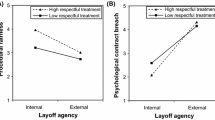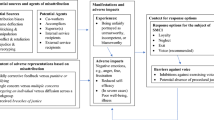Abstract
Prior negative performance and wrongdoing are difficult for applicants to overcome during their job search. The result has often been that they resort to lies and deception in order to obtain employment. The present study examines “stealing thunder” as a trust repair tactic that might be useful for overcoming prior indiscretions when it is used by applicants during the selection interview process. Stealing thunder refers to the self-disclosure of negative information that preempts allegations of wrongdoing by third parties such as hiring managers. Data were collected (n = 184) using a scenario-based 2 (accept responsibility; blame others) X 2 (low, high likelihood of discovery) experimental design in which perceptions of integrity, trust, and employability were measured. Results indicated that a stealing thunder strategy that involved accepting responsibility under a low likelihood of transgression discovery led to higher ratings of trust than blaming others when discovery of wrongdoing was imminent. The stealing thunder strategy was somewhat more effective than when a traditional, post-allegation apology was used. But stealing thunder did not lead to higher levels of an overall willingness to hire the applicant.
Similar content being viewed by others
Notes
Complete scenarios are available from the first author.
References
Arpan, L. M., & Roskos-Ewoldsen, D. R. (2005). Stealing thunder: Analysis of the effects of proactive disclosure of crisis information. Public Relations Review, 31(3), 425–433.
Bies, R. J. (1987). The predicament of injustice: The management of moral outrage. In L. L. Cummings & B. M. Staw (Eds.), Research in organizational behavior (pp. 289–319). Greenwich: JAI Press.
Burgoon, J. K., & Buller, D. B. (1994). Interpersonal deception: III. Effects of deceit on perceived communication and nonverbal behavior dynamics. Journal of Nonverbal Behavior, 18(2), 155–184.
Carson, E. A. (2015). Prisoners in 2014. Retrieved March 30, 2016, from http://www.bjs.gov/content/pub/pdf/p14.pdf.
Choi, J. J., & Severson, M. (2009). “What! What kind of apology is this?”: The nature of apology in victim offender mediation. Children and Youth Services Review, 31(7), 813–820.
Dunbar, N. E., Jensen, M. L., Bessarabova, E., Burgoon, J. K., Bernard, D. R., Harrison, K. J., et al. (2014). Empowered by persuasive deception: The effects of power and deception on dominance, credibility, and decision making. Communication Research, 41, 852–876.
Ebesu Hubbard, A. S., Hendrickson, B., Szejda Fehrenbach, K., & Sur, J. (2013). Effects of timing and sincerity of an apology on satisfaction and changes in negative feelings during conflicts. Western Journal of Communication, 77, 305–322.
Fennis, B. M., & Stroebe, W. (2014). Softening the blow: Company self-disclosure of negative information lessens damaging effects on consumer judgment and decision making. Journal of Business Ethics, 120(1), 109–120.
Fleming, P., & Zyglidopoulos, S. C. (2008). The escalation of deception in organizations. Journal of Business Ethics, 81, 837–850.
Fletcher, C. (1992). Ethical issues in the selection interview. Journal of Business Ethics, 11, 361–367.
Hogue, M., Levashina, J., & Hang, H. (2013). Will I fake it? The interplay of gender, machiavellianism, and self-monitoring on strategies for honesty in job interviews. Journal of Business Ethics, 117, 399–411.
Howley, M. J. (2009). The use of apology in health care. Journal of Medical Marketing: Device, Diagnostic and Pharmaceutical Marketing, 9, 279–289.
Jehle, A., Miller, M. K., Kemmelmeier, M., & Maskaly, J. (2012). How voluntariness of apologies affects actual and hypothetical victims’ perceptions of the offender. The Journal of Social Psychology, 152(6), 727–745.
Jones Young, N. C., & Powell, G. N. (2015). Hiring ex-offenders: A theoretical model. Human Resource Management Review, 25, 298–312.
Kelley, H. H. (1973). The process of causal attribution. American Psychologist, 28(2), 107–128.
Kim, P. H., Dirks, K. T., Cooper, C. D., & Ferrin, D. L. (2006). When more blame is better than less: The implications of internal versus external attributions for the repair of trust after a competence-vs. integrity-based trust violation. Organizational Behavior and Human Decision Processes, 99, 49–65.
Kim, P. H., Ferrin, D. L., Cooper, C. D., & Dirks, K. T. (2004). Removing the shadow of suspicion: The effects of apology versus denial for repairing competence- versus integrity based trust violations. Journal of Applied Psychology, 89(1), 104–118.
Klotz, A. C., da Motta Veiga, S. P., Buckley, M. R., & Gavin, M. B. (2013). The role of trustworthiness in recruitment and selection: A review and guide for future research. Journal of Organizational Behavior, 34, 104–119.
Levashina, J., & Campion, M. A. (2006). A model of faking likelihood in the employment interview. International Journal of Selection and Assessment, 4, 299–316.
McGuire, W. J. (1961a). The effectiveness of supportive and refutational defenses in immunizing and restoring beliefs against persuasion. Sociometry, 24, 184–197.
McGuire, W. J. (1961b). Resistance to persuasion conferred by active and passive prior refutation of the same and alternative counterarguments. Journal of Abnormal and Social Psychology, 63, 326–332.
McGuire, W. J. (1962). Persistence of the resistance to persuasion induced by various types of prior belief defenses. Journal of Abnormal and Social Psychology, 64, 241–248.
McGuire, W. J., & Papageorgis, D. (1962). Effectiveness of forewarning in developing resistance to persuasion. Public Opinion Quarterly, 26, 24–34.
Papageorgis, D., & McGuire, W. J. (1961). The generality of immunity to persuasion produced by pre-exposure to weakened counterarguments. Journal of Abnormal and Social Psychology, 62, 475–481.
Reimsbach, D., & Hahn, R. (2015). The effects of negative incidents in sustainability reporting on investors’ judgments–an experimental study of third-party versus self-disclosure in the realm of sustainable development. Business Strategy and the Environment, 24, 217–235.
Rotte, K., Chandrashekaran, M., Tax, S. S., & Grewal, R. (2006). Forgiven but not forgotten Covert uncertainty in overt responses and the paradox of defection-despite-trust. Journal of Consumer Psychology, 16, 283–294.
Rycyna, C. C., Champion, C. D., & Kelly, A. E. (2009). First impressions after various types of deception: Less favorable following expectancy violation. Basic and Applied Social Psychology, 31, 40–48.
Schlenkler, B. R. (1980). Impression management: The self-concept, social identity, and interpersonal relations. Monterey, CA: Brooks/Cole.
Tomlinson, E. C., & Carnes, A. M. (2015). When promises are broken in a recruitment context: The role of dissonance attributions and constraints in repairing behavioural integrity. Journal of Occupational and Organizational Psychology, 88, 415–435.
Tsai, W. C., Huang, T.-C., Wu, C.-Y., & Lo, I.-H. (2010). Disentangling the effects of applicant defensive impression management tactics in job interviews. International Journal of Selection and Assessment, 18(2), 131–140.
Tyler, J. M., & Feldman, R. S. (2007). The double-edged sword of excuses: When do they help, when do they hurt. Journal of Social and Clinical Psychology, 26(6), 659–688.
Williams, K. D., Bourgeois, M. J., & Croyle, R. T. (1993). The effects of stealing thunder in criminal and civil trials. Law and Human Behavior, 17(6), 597.
Wirtz, J., & Mattila, A. S. (2004). Consumer responses to compensation, speed of recovery and apology after a service failure. International Journal of Service Industry Management, 15, 150–166.
Author information
Authors and Affiliations
Corresponding author
Appendix: Interview Dialog Relevant to Manipulations
Appendix: Interview Dialog Relevant to Manipulations
“Before you contact my references and make your decision, I want you to know the details about why I left my last job at American Manufacturing. I got caught up in a bad situation and had to leave.
High Likelihood of Discovery “My references along with almost everyone else at American Manufacturing know all about this unfortunate situation. They know what happened to me and why I left the company. So I’m sure that you were going to find out about everything sooner or later. But that’s not why I’m telling you now. I’m telling you because I’m hoping that once you understand the situation, you’ll be willing to give me a chance to show you what kind of an employee I can be.”
Low Likelihood of Discovery “Other than my boss and me, no one knows anything about the situation or what happened to me. As far as everyone else knows, I resigned voluntarily. Other people have no idea that I was asked to resign or why. My boss promised me he wouldn’t tell anyone. And now, I know that he’s retired and living somewhere in Florida. So, there’s almost no chance that you would have ever found out about this unfortunate situation. But, I’ve decided to tell you anyway. I’m hoping that once you understand the situation, you’ll be willing to give me a chance to show you what kind of employee I can be.”
Accept Responsibility “Right up front, I admit that I was guilty of knowingly approving a reimbursement request that was a policy violation. I have no one to blame but myself. I wish that there was some way to undo the poor decision that I made. I regret being responsible for an inappropriate reimbursement getting approved…Here’s what happened.”
Blame Others “Right up front, I admit that I approved a questionable reimbursement request that ended up being a policy violation. But, you should also know that I was only partially guilty. I wish there was a way to undo the whole situation because I am sorry for the part that I played. I regret having contributed to a situation…Here’s what happened.”
Rights and permissions
About this article
Cite this article
Krylova, K.O., Longacre, T.E. & Phillips, J.S. Applicants with a Tarnished Past: Stealing Thunder and Overcoming Prior Wrongdoing. J Bus Ethics 150, 793–802 (2018). https://doi.org/10.1007/s10551-016-3216-5
Received:
Accepted:
Published:
Issue Date:
DOI: https://doi.org/10.1007/s10551-016-3216-5




